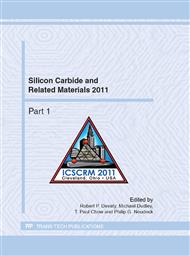p.981
p.985
p.989
p.993
p.997
p.1001
p.1005
p.1009
p.1013
Thermal Stress Response of Silicon Carbide pin Diodes Used as Photovoltaic Devices
Abstract:
Recent progress in the field of silicon carbide sensor technology, such as wireless communications and sensors, has demonstrated the need for a resilient energy supply as an alternative to conventional batteries. Previous work has shown that silicon carbide is an effective energy harvester of UV light in high temperature and hostile environments. Until now however, there has been little work undertaken to assess the long-term effects of elevated temperature on such devices. Although it is understood that silicon carbide is unaffected by long-term temperature exposure below 400 °C, there has been little research into the overall device response and how changes in contact metallisation affect the photovoltaic behaviour.
Info:
Periodical:
Pages:
997-1000
Citation:
Online since:
May 2012
Keywords:
Price:
Сopyright:
© 2012 Trans Tech Publications Ltd. All Rights Reserved
Share:
Citation:


